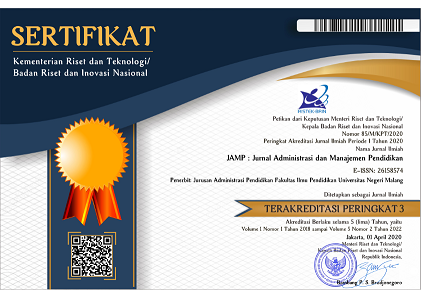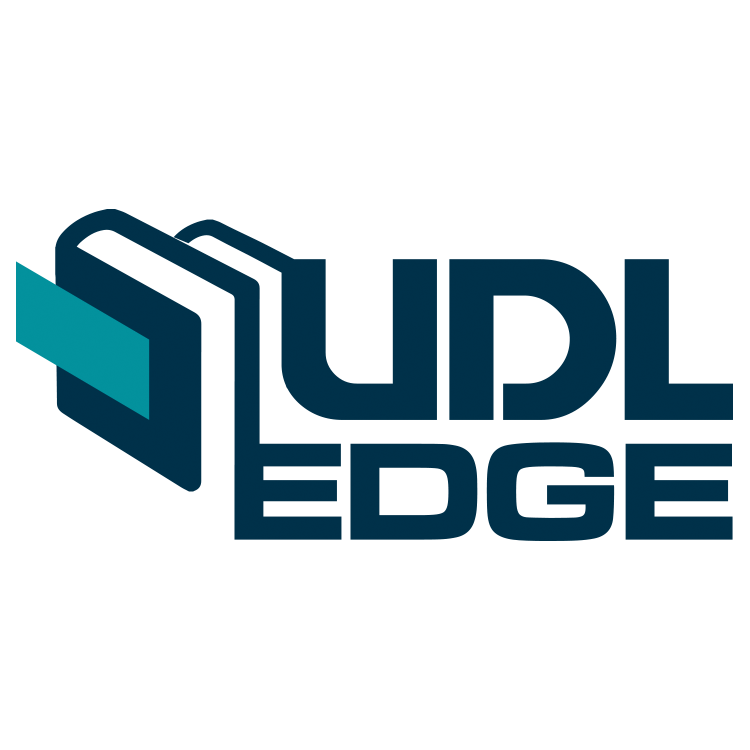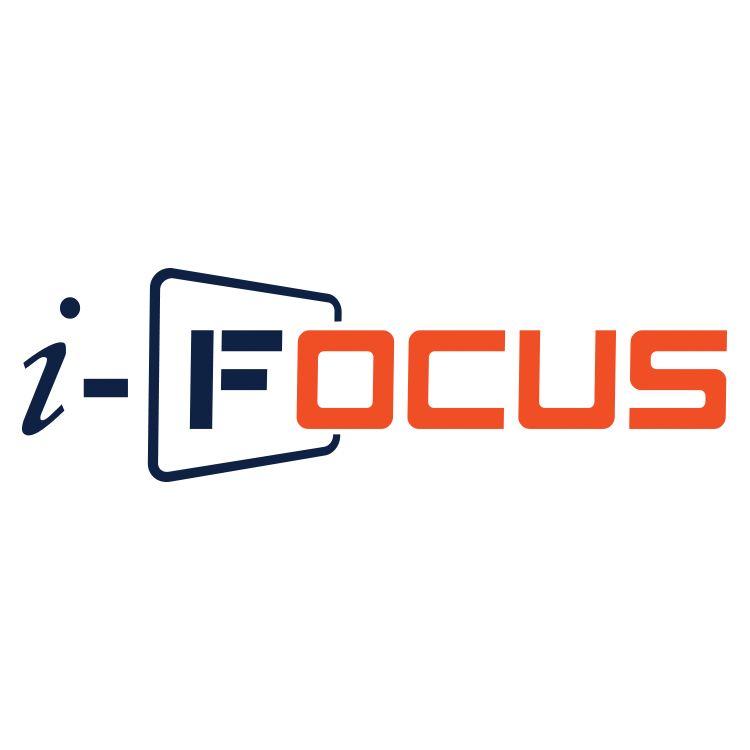Evaluasi Program Sistem Manajemen Sekolah Dasar Menggunakan Model Countenance Stake
Abstract
Abstract: The purpose of this study was to determine the evaluation of elementary school management programs using the Countenance Stake model. Quantitative approach is used in this research. The population of this study was the principals of district/city public elementary schools in East Java Province, totaling 1,323 people. The sampling technique used was cluster random sampling and simple random sampling, with a total of 290 people or 22 percent of the population. Data collection was carried out using a research instrument in the form of a questionnaire. Data analysis using path coefficient testing. The results showed that the strategic planning and financing management variables had a greater direct influence than the indirect influence through school culture and principal performance on school quality. Meanwhile, the variables of organizing, curriculum management, student management, education staff management, facility and infrastructure management, financing management, and community participation management have a greater indirect effect than the indirect effect through school culture and school principals' performance on school quality. Preparation (antecedents) as in the Countenance Stake model, has a direct influence on transactions and outcomes.
Keywords: Program Evaluation, Elementary School Management, Countenance Stake Model.
Abstrak: Tujuan penelitian ini untuk mengetahui evaluasi program manajemen sekolah dasar menggunakan model Countenance Stake. Pendekatan kuantitatif digunakan dalam penelitian ini. Populasi penelitian ini yaitu kepala sekolah dasar negeri kabupaten/kota Provinsi Jawa Timur yang berjumlah 1.323 orang. Teknik pengambilan sampel yang digunakan yaitu cluster random sampling dan simple random sampling, dengan jumlah 290 orang atau 22 persen dari populasi. Pengumpulan data dilakukan dengan menggunakan instrumen penelitian berbentuk angket. Analisis data menggunakan pengujian koefisien jalur. Hasil penelitian menunjukkan variabel strategi perencanaan dan manajemen pembiayaan memberikan pengaruh langsung lebih besar dibandingkan pengaruh tidak langsung melalui budaya sekolah dan kinerja kepala sekolah terhadap mutu sekolah. Sementara itu, variabel pengorganisasian, manajemen kurikulum, manajemen siswa, manajemen tenaga pendidikan, manajemen sarana dan prasarana, manajemen pembiayaan, dan manajemen partisipasi masyarakat memberikan pengaruh tidak langsung lebih besar dibandingkan pengaruh tidak langsung melalui budaya sekolah dan kinerja kepala sekolah terhadap mutu sekolah. Persiapan (antecedents) seperti dalam model Countenance Stake, memberikan pengaruh secara langsung terhadap transaksi dan hasil (outcome).
Kata kunci: Evaluasi Program, Manajemen Sekolah Dasar, Model Countenance Stake.
Full Text:
PDFReferences
Babelan, Z., Koulaei, A., Moeinikia, G., Sharif; & Rezaei, A. (2019). Instructional leadership effects on teachers’ work engagement: roles of school culture, empowerment, and job characteristics. CEPS Journal 9 (2019) 3, S. 137-156, 9(3), 137–156.
Cheng, E. C. K. (2021). Knowledge management for improving school strategic planning. Educational Management Administration and Leadership, 49(5), 824–840.
Cheng, X., Wang, S., Huang, W., Wang, F., Fang, S., Ge, R., Zhang, Q., Zhang, L., Du, W., Fang, F., Feng, Q., Cao, J., & Luo, J. (2022). Current status of hypochlorite technology on the wastewater treatment and sludge disposal: Performance, principals and prospects. Science of The Total Environment, 803, 150085.
Day, C., Gu, Q., & Sammons, P. (2016). The Impact of Leadership on Student Outcomes: How Successful School Leaders Use Transformational and Instructional Strategies to Make a Difference. Educational Administration Quarterly, 52(2), 221–258.
Dewantara, I. P. M. (2017). Stake Evaluation Model (Countenance Model) in Learning Process Bahasa Indonesia at Ganesha University of Educational. International Journal of Language and Literature, 1(1), 19–29. https://doi.org/10.23887/IJLL.V1I1.9615
DuBrin, A. J. (2011). Essentials of Management, Ninth Edition. 684. https://lib.hpu.edu.vn/handle/123456789/30156
Elvira, E. (2021). Birokrasi dan Korupsi dalam Penggunaan Dana Bantuan Operasional Sekolah (BOS) pada Pemerintahan Daerah Kabupaten Donggala Sulawesi Tengah pada Tahun 2013-2015. Iqra: Jurnal Ilmu Kependidikan Dan Keislaman, 16(1), 22–27.
Erickson, F. (1987). Conceptions of School Culture: An Overview. Educational Administration Quarterly, 23(4), 11–24.
Fleischmann, A., Holck, L., Liu, H., Muhr, S. L., & Murgia, A. (2022). Organizing solidarity in difference: Challenges, achievements, and emerging imaginaries. Https://Doi.Org/10.1177/13505084221083907, 29(2), 233–246.
Flower, A., McKenna, J. W., & Haring, C. D. (2016). Behavior and classroom management: Are teacher preparation programs really preparing our teachers? Https://Doi.Org/10.1080/1045988X.2016.1231109, 61(2), 163–169.
Franklin, H., & Harrington, I. (2019). A Review into Effective Classroom Management and Strategies for Student Engagement: Teacher and Student Roles in Today’s Classrooms. Journal of Education and Training Studies, 7(12), 1.
Harjanti, R., Supriyati, Y., & Rahayu, W. (2019). Evaluation of Learning Programs at Elementary School Level of “Sekolah Alam Indonesia (SAI)”. (Evaluative Research Using Countenance Stake’s Model). American Journal of Educational Research, Vol. 7, 2019, Pages 125-132, 7(2), 125–132.
Heyneman, S. P. (2022). When Models Become Monopolies: The Making of Education Policy at the World Bank. 35–55. https://doi.org/10.1007/978-981-19-1604-5_2
Houston, D. M., Henderson, M., Peterson, P. E., & West, M. R. (2021). Status, Growth, and Perceptions of School Quality. Https://Doi.Org/10.3102/01623737211030505, 44(1), 105–126. https://doi.org/10.3102/01623737211030505
Jailani, B. (2019). An evaluation of mathematics learning program at primary education using Countenance Stake Evaluation model. Jurnal Penelitian Dan Evaluasi Pendidikan, 23(2), 156–169. https://doi.org/10.21831/pep.v23i2.16473
Kadri, H. al, & Widiawati, W. (2020). Strategic Planning in Developing the Quality of Educators and Education Personnel. Indonesian Research Journal in Education |IRJE|, 4(2), 324–346. https://doi.org/10.22437/irje.v4i2.9410
Kok, H. B., Mobach, M. P., & Omta, O. S. W. F. (2011). The added value of facility management in the educational environment. Journal of Facilities Management, 9(4), 249–265. https://doi.org/10.1108/14725961111170662
Maguire, H., Harper, J. M., Gardner, R. M., & Luiselli, J. K. (2022). Behavioral Training and Performance Management of Human Services Organization Care Providers During the COVID-19 Pandemic. Advances in Neurodevelopmental Disorders, 6(3), 340–348. https://doi.org/10.1007/S41252-021-00234-6/TABLES/4
Mohrman, S. Albers., & Wohlstetter, P. (1994). School-Based Management: Organizing for High Performance. 302.
Nehez, J., & Blossing, U. (2020). Practices in different school cultures and principals’ improvement work. Https://Doi.Org/10.1080/13603124.2020.1759828, 25(2), 310–330. https://doi.org/10.1080/13603124.2020.1759828
Nojavan, M., Heidari, A., & Mohammaditabar, D. (2021). A fuzzy service qualitybased approach for performance evaluation of educational units. Socio-Economic Planning Sciences, 73,
Nurdin, A. A. (2019). School Culture to Serve Performance of Madrasah in Indonesia. QIJIS (Qudus International Journal of Islamic Studies), 7(1), 71–100.
Olken, B. A., & Pande, R. (2011). Corruption in Developing Countries. Https://Doi.Org/10.1146/Annurev-Economics-080511-110917, 4, 479–509.
Org, W. C., & Jerald, C. D. (2006). School Culture: Center for Comprehensive School Reform and Improvement. www.centerforcsri.org
Parlier, T. R., Rocconi, L. M., Skolits, G., & Davidson, C. T. (2020). The Effect of Learning Community Participation on Community College Students’ Perceptions of Learning Gains and Engagement. Https://Doi.Org/10.1080/10668926.2020.1852983, 46(4), 272–283.
Ramadhani, L., & Suparno, S. (2020). Pengaruh Sistem Pengendalian Internal Pemerintah (SPIP) dan Peran Komite Sekolah Terhadap Pencegahan Fraud Pengelolaan Dana Bantuan Operasional Sekolah (BOS) Pada SMP Negeri Di Banda Aceh. Jurnal Ilmiah Mahasiswa Ekonomi Akuntansi, 5(3), 400–411. https://jim.unsyiah.ac.id/EKA/article/view/16047
Reinikka, R., Svensson, J., Reinikka, R., & Svensson, J. (2005). Fighting Corruption to Improve Schooling: Evidence from a Newspaper Campaign in Uganda. Journal of the European Economic Association, 3(2–3), 259–267. https://doi.org/10.1111/(ISSN)1542-4774/ISSUES
Sanders, M. G. (2003). Community Involvement in Schools: From Concept to Practice. Education and Urban Society, 35(2), 161–180.
Sewell, W. H., Haller, A. O., & Portes, A. (2018). The educational and early occupational attainment process. Inequality: Classic Readings in Race, Class, and Gender, 237–255.
Stake, R. E. (1961). “Overestimation” of Achievement with the California Achievement Test. Educational and Psychological Measurement, 21(1), 59–62. https://doi.org/10.1177/001316446102100104/ASSET/001316446102100104.FP.PNG_V03
Stake, R. E. (1970). Objectives, priorities, and other judgment data. Review of Educational Research, 40(2), 181–212. https://doi.org/10.3102/00346543040002181/ASSET/00346543040002181.FP.PNG_V03
Stake, R. E. (1976). A Theoretical Statement of Responsive Evaluation. Studies in Educational Evaluation.
Stake, R. E. (1990). Situational context as influence on evaluation design and use. Studies in Educational Evaluation, 16(2), 231–246. https://doi.org/10.1016/S0191-491X(05)80027-6
Stake, R. E. (2010). Qualitative research: studying how things work. 244. https://books.google.com/books/about/Qualitative_Research.html?hl=id&id=NYZYAAAAYAAJ
Stake, R. E. (2022). The Countenance of Educational Evaluation. Https://Doi.Org/10.1177/016146816706800707, 68(7), 1–15.
Sulfiati, F., Alam, A. S., & Irwan, A. L. (2010). Akuntabilitas Pengelolaan Dana Bantuan Operasional Sekolah (BOS) dalam Penyelenggaraan Pendidikan di Kabupaten Sinjai. Government: Jurnal Ilmu Pemerintahan, 3(2), 113–122.
Sunaengsih, C., Anggarani, M., Amalia, M., Nurfatmala, S., & Naelin, S. D. (2019). Principal Leadership in the Implementation of Effective School Management. Elementary School Forum (Mimbar Sekolah Dasar), 6(1), 79–91.
Tirado, B., Concepción, M., Barriga, D., Concepción Barrón Tirado, M., & Díaz Barriga, F. (2016). Curriculum Management and the Role of Curriculum Actors. TCI (Transnational Curriculum Inquiry), 13(2), 13–33.
Tyler, R., Gagne, R., & Scriven, M. (1967). Toward a Technology for the Evaluation of Educational Programs. Rand McNally & Company, Box 7600, Chicago, Illinois 60680 (Complete document 102 pages, $2.00).
van Dyk, H., & White, C. J. (2019). Theory and practice of the quintile ranking of schools in South Africa: A financial management perspective. South African Journal of Education, 39. https://doi.org/10.15700/SAJE.V39NS1A1820
van Waeyenberg, T., Peccei, R., & Decramer, A. (2020). Performance management and teacher performance: the role of affective organizational commitment and exhaustion. Https://Doi.Org/10.1080/09585192.2020.1754881, 33(4), 623–646.
Wood, B. B. (2010). Stake’s Countenance Model: Evaluating an Environmental Education Professional Development Course. Https://Doi.Org/10.1080/00958960109599134, 32(2), 18–27.
Refbacks
- There are currently no refbacks.
Copyright (c) 2023 Teguh triwiyanto

This work is licensed under a Creative Commons Attribution-ShareAlike 4.0 International License.


This work is licensed under a Creative Commons Attribution-NonCommercial-ShareAlike 4.0 International License.









12.png)